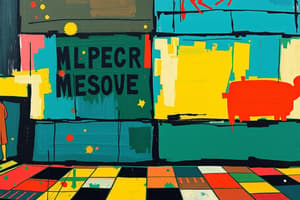Podcast
Questions and Answers
What is punishment?
What is punishment?
It is the redress that the state takes against an offending member of society that usually involves pain and suffering.
What does the term 'penalty' refer to?
What does the term 'penalty' refer to?
The suffering that is inflicted by the state for the transgression of the law.
What is the 4th Pillar of the Criminal Justice System tasked to do?
What is the 4th Pillar of the Criminal Justice System tasked to do?
What is institutional correction?
What is institutional correction?
Signup and view all the answers
Jail is not considered an institution for correction.
Jail is not considered an institution for correction.
Signup and view all the answers
What is a pillory?
What is a pillory?
Signup and view all the answers
Define branding as a form of punishment.
Define branding as a form of punishment.
Signup and view all the answers
What does flagellation mean?
What does flagellation mean?
Signup and view all the answers
What is impalement?
What is impalement?
Signup and view all the answers
What is the significance of the Code of Ur-Nammu?
What is the significance of the Code of Ur-Nammu?
Signup and view all the answers
Study Notes
Punishment and Correction
- Punishment is a state-imposed response to an individual's crime, aimed at inflicting pain or suffering.
- It serves as a penalty for transgressions against the law and is derived from Latin "correctionem," meaning "an amendment" or "to put straight."
- Institutional Corrections is a method of rehabilitating offenders within an institutional setting, facilitating their reintegration into society.
- Institutional Corrections provide necessary treatment for high-risk offenders through incarceration, contrasting community-based rehabilitation.
Forms of Punishment
- Pillory: A wooden or metal framework where an offender's head and wrists are immobilized; subjected to public humiliation and abuse for a set duration based on the crime.
- Stocks: A wooden apparatus for confining a person's wrists and legs while seated, allowing for public shaming.
- Branding: Involves burning marks onto a person's skin for identification and punishment purposes, resulting in permanent scarring.
Early Corporal Punishments
- Flagellation: Systematic whipping of the body, derived from "flagellum" (Latin for whip), typically targeting the back to inflict pain.
- Impalement: A brutal capital punishment method involving piercing the body with a sharp object, leading to death through severe injury.
- Ducking Stool: Used primarily from the 1600s to early 1800s, offenders were plunged into water as punishment, acting as a public spectacle.
Early Capital Punishments
- Decapitation: Considered honorable, this involves severing the head from the body with an axe or sword, symbolizing nobility.
- Guillotine: A device designed for swift decapitation during executions, representing a more humane method at the time.
- Firing Squad: Executes a prisoner by simultaneous shooting from a group of soldiers, often with the individual blindfolded to obscure the executioner’s identity.
Historical Legal Codes
- Code of Ur-Nammu: The earliest known law code, originating in Mesopotamia around 2100-2050 BCE, highlighting the beginnings of legal enforcement and penalties.
Studying That Suits You
Use AI to generate personalized quizzes and flashcards to suit your learning preferences.
Description
This quiz focuses on the concepts of punishment and penalties within the realm of institutional correction. It explores the state's role in enforcing laws and the implications of correction as a means of redress for offenders. Test your understanding of these critical components in the study of correction administration.




